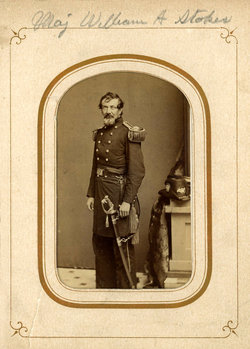William Axton Stokes facts for kids
Quick facts for kids
Major
William Axton Stokes
|
|
|---|---|

Stokes in a Civil-War era photo
|
|
| Born | 1814 Philadelphia, Pennsylvania |
| Died | May 3, 1877 Philadelphia, Pennsylvania |
| Buried |
Saint John the Evangelist Church Cemetery, Philadelphia, Pennsylvania
|
| Allegiance | Union |
| Service/ |
Union Army |
| Rank | Major |
| Unit | 18th U.S. Infantry |
| Battles/wars | American Civil War |
| Other work | Attorney, Pennsylvania Railroad Company |
William Axton Stokes (1814 – May 3, 1877) was an important lawyer from Philadelphia, Pennsylvania. He lived for a while in Greensburg, Pennsylvania, where he worked for the Pennsylvania Railroad Company. Stokes also served as a major in the American Civil War. He even owned a local newspaper called The Republican for a time.
Contents
Stokes Mansion and Andrew Carnegie
In 1850, when William Stokes was 36, the Pennsylvania Railroad Company asked him to move to southwestern Pennsylvania. He settled in Greensburg, Pennsylvania, in Westmoreland County. His home was a large house on a hilltop, known as Stokes Mansion. This land later became part of Seton Hill University.
A Special Meeting
While living in Greensburg, Stokes read an article by a young telegraph operator named Andrew Carnegie. The article was about how people felt about the Pennsylvania Railroad. Stokes was so impressed that he invited Carnegie to visit and stay overnight at his mansion.
Carnegie later wrote about this visit in his autobiography. He said it was unusual for Mr. Stokes to invite him, as Carnegie was just a young man. But he was very impressed by Stokes's beautiful home.
The Inspiring Library
What impressed Carnegie the most was Stokes's private library. It was the first private library Carnegie had ever seen. He was amazed by a marble fireplace in the library. Carved into the marble was an open book with a powerful message: "He that cannot reason is a fool, He that will not a bigot, He that dare not a slave."
These words deeply moved Carnegie. He decided that one day he would have his own library. He also wanted these same words carved into his fireplace. This experience helped inspire Carnegie to later build many public libraries around the world.
The Mansion Today
After Stokes sold the property, the Sisters of Charity bought it. They used the mansion as a "Mother House" for the sisters. Later, it became Saint Mary's School for boys. The building is still standing today on the Seton Hill University campus. It is now called St. Mary Hall, and it has been changed and used for many different things over the years.
Civil War Service
William Stokes served as a major in the U.S. Infantry during the American Civil War. In 1861, he was in charge of the 18th U.S. Infantry Headquarters at Camp Thomas in Franklin County, Ohio.
A Powerful Speech
In 1861, Stokes gave a strong speech at the Union Convention in Westmoreland County, Pennsylvania. He spoke in favor of keeping the United States united and supported the war to stop the rebellion. He argued that the rebel states had no right to leave the Union. He also said they had no good reason to fight against Abraham Lincoln becoming president.
After the War
After the Civil War, William Stokes continued his work. In 1874, he was part of a group chosen to review how the Pennsylvania Railroad Company was operating.
Some of Stokes's personal papers are kept at Villanova University. Other documents related to him can be found at the University of Delaware Library.
Personal Life
William Stokes was married twice. His first wife was Mary Scanlan (1815-1848). His second wife was Nancy Williams (1821-1894), who was from Greensburg, Pennsylvania. He passed away on May 3, 1877, in Philadelphia. He is buried at Saint John the Evangelist Church Cemetery.
Lasting Inspiration
In 2018, a professor at Seton Hill University named James Bosco opened a restaurant in Greensburg. He named the restaurant "Major Stokes" to honor William Stokes. This restaurant is located on the land that Stokes once owned.
 | Anna J. Cooper |
 | Mary McLeod Bethune |
 | Lillie Mae Bradford |

